Our Interview With Craig Johnson, Author of the "Longmire" series
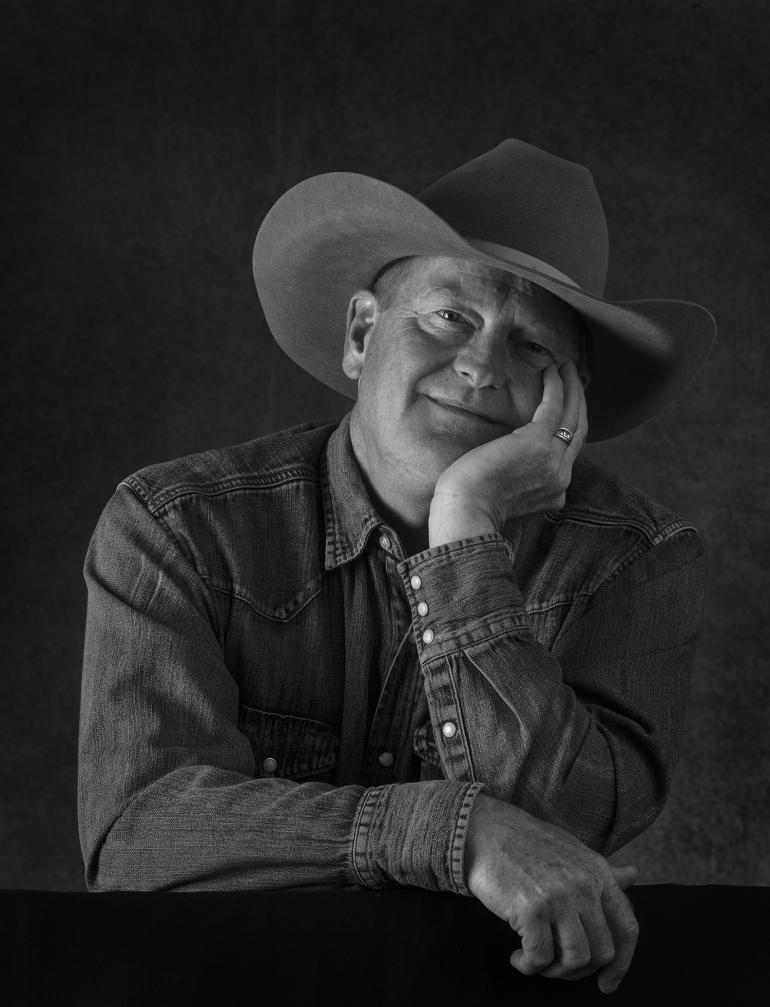
Craig Johnson author photo
With all due respect to the other writers and their fictional creations featured in this issue, but the detective that we would most like to sit and have a beer with has got to be Walt Longmire. And if we could have that beer in the Red Pony, with Walt's buddy Henry Standing Bear, well, that'd just be a continual soiree, wouldn't it?
Longmire has appeared in seventeen novels and is much beloved by anyone who likes their detectives to have a little sense of humor to go with their brooding. In addition to the robust popularity of the Longmire novels, the television adaptation thereof, starring Robert Taylor, Katee Sackhoff, and Lou Diamond Phillips, was a smash hit and continues to find new fans on Netflix.
While his job is as the Sheriff of the (fictional) Absaroka County, Wyoming, he frequently comes to Montana. He was first married in Miles City, and later had an occasion to pretend to be an insurance investigator from Billings. But his latest mystery takes Longmire to eastern Montana, where a tragic case will vex even his crime-solving abilities.
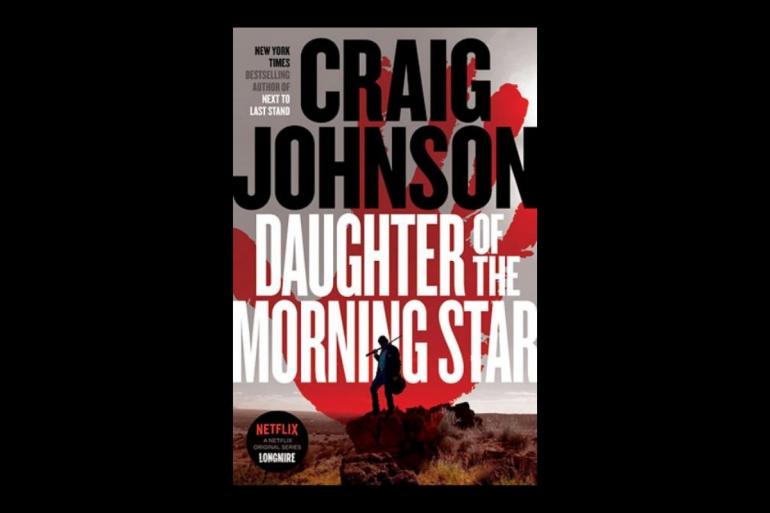
Daughter of the Morning Star by Craig Johnson
Distinctly Montana: First of all, Mr. Johnson, please let us say that we're big fans of yours, and we're a little jealous of Wyoming for being able to lay claim to you. Any chance you'll ever realize the grass is greener up here in Montana?
Craig Johnson: Well, thank you. I've always taken the view my Cheyenne friend Leroy Whiteman had when he talked about that border between the two states, "You know, I have hunted and fished that entire area, and I've never seen that line they talk about." I spend quite a bit of time up in Montana and just got back from drifting the Bighorn River with my friend Hale Harris, so you don't have to sell me on the place.
DM: You are often compared to your own character, Walt Longmire. I find it interesting to note, though, that he's significantly older than you, as he served in Vietnam, during which you were a pretty young kid. Why did you make Walt older than yourself?
C.J.: When they first started entertaining the thought of the TV show Longmire, the executives floated the idea of taking the Walt from my books and making him younger, but rapidly came to the conclusion that the world-weary twenty-six-year-old might be more than viewers could bear. I kind of agree with that. I wanted Walt to be the sadder but wiser sheriff with a lot of history and baggage to explore in subsequent novels. There are a lot of folks in law enforcement that come from a military background, and for Walt to be able to do the things he does, he'd need to have acquired those skills and knowledge from somewhere.
As to the two of us being similar, my wife has the best remark about that. "Walt is who Craig would like to be in ten years, it's just that he's off to a very slow start."
DM: Walt is remarkably well-read, reading or quoting writers like Balzac, Conan Doyle, and John Donne. Why did you choose to make Longmire so well-read?
C.J.: When I first started writing the novels, he wasn't so well-read, and I have to admit that I found him dull, so I decided he needed to be smarter than me so that he could keep me on my toes as well as my audience. I just figured that since the books were going to be written in first-person, I should make Walt's head an interesting place to be. It's fascinating in that most people think of cowboys as being illiterate, but back in the day, most of them spent the off-season wintered-up, and what's the one thing most took with them?—a stack of books. Heck, the most mentioned reading material in Louis L'Amour was Plutarch's Lives…
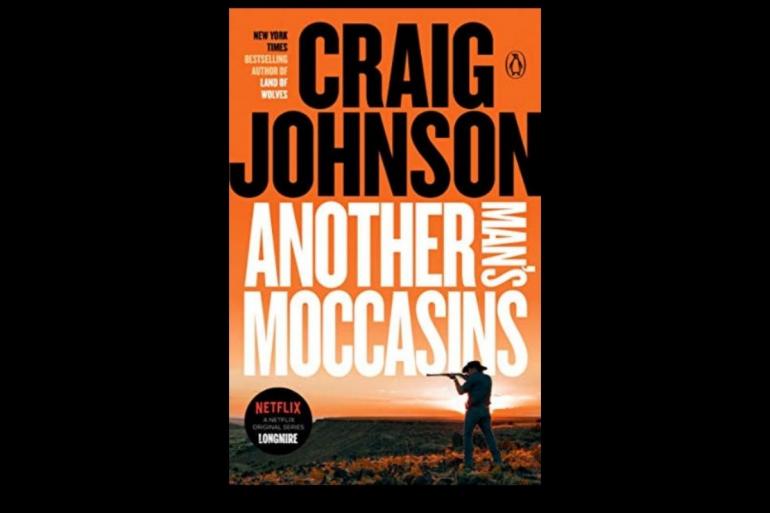
Another Man's Moccasins by Craig Johnson
DM: Who's your favorite Western or crime fiction writer?
C.J.: Oh, that question could take pages… I've always been a big fan of John Steinbeck and got into an argument at the Western Writers of America Conference over whether or not Steinbeck was a western writer. Honestly, the writer of The Red Pony, Of Mice And Men, Grapes of Wrath? I'm also starting to weaken toward Hemingway as of late. I've been invited to do the keynote at the International Hemingway Association Conference and stay at the Hemingway House over in Ketchum so started re-reading his entire canon. I think one of the worst things you can do to an author is to start to read their work when you're too young to really understand them.
DM: The Western crime thriller is enjoying a lot of popularity right now. Why do you think so much of the country loves this kind of stories?
C.J.:I remember my good buddy Tony Hillerman once told me, "Don't ever forget to tell a good story, Craig. You've ridden behind a hundred head of cattle with enough drag riders and sat on enough porches snapping green beans that you should know a good story when you hear one."
He was right. The Walt books are written in first-person, so it's almost like a three-hundred-page, stream of consciousness monologue, so it's easy to see Walt sitting on a stool at the Busy Bee Café and turning toward a reader and saying, "Let me tell you about what happened to me last month…" At that point I don't want the reader to even remember that they're reading a book; I want them to fell into that world and not come back out until the end.
Choosing to write a novel and subsequently a series in the least populated county in the least populated state is kind of telling on my feeling about place as a central component in my books. When you're talking about a place with the vastness of the American West, it's going to have an effect on the stories and the characters. People often ask why my protagonist Walt Longmire doesn't carry a cellphone? I always think, you've never been to Wyoming, have you?
DM: The world of Longmire is much like ours, but a little different, in that Absaroka County is fictional and the Northern Cheyenne reservation is placed within Wyoming. What are the advantages of writing in an invented geography?
C.J.: Well, I never wanted people to become confused and think I was writing documentaries. I kind of swung Absaroka County north and the Northern Cheyenne and Crow Reservations south because I wanted more of a Native presence in the novels. I also think you have a certain amount of literary license, or you can become hidebound. I remember doing ride-alongs with the sheriff here in Johnson County and him turning to me and saying, "You've got a mistake right there in the first chapter of The Cold Dish ( the first Longmire novel). You've got Walt taking a right on Fort and then a left on Aspen, but Aspen is one-way." All I could think was, I'm not going to fight this crap all my life…
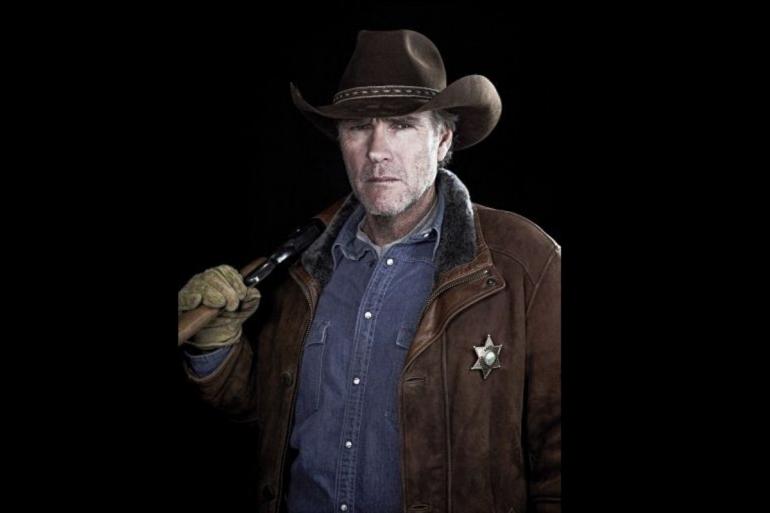
Promotional still from Netflix's Longmire
DM: Speaking of which, AbsarokAH or AbsarokEE?
C.J.: AbsarokAH! I was talking to my friend and model for Henry Standing Bear, Marcus Red Thunder, and I told him I was thinking about calling my fictional location Absarka (yet another pronunciation for the word the Crow use to describe themselves: children of the long-beaked bird) County. And he asked, "Is it mostly white people in this county?"
I said, "Yep."
"Then they would probably mispronounce it as AbsarokAH."
DM: Your latest Longmire novel, Daughter of the Morning Star, is set in and around Lame Deer Montana, and involves the tragedy of missing indigenous women on Native-American land. What made you set the book in Montana and shed light on the subject matter?
C.J.: I was doing a library event up in Hardin on the Crow Reservation a few years back when I looked up and noticed a missing persons poster on the community bulletin board. It was a simple computer copy with the face of a young woman, bright-eyed and smiling and now… Gone. The words were desperate and pleading and a reward was posted. Her face was faded, and the paper wrinkled and yellowed with age—a fervent and unanswered prayer that fluttered against the bulletin board like a turning page every time the door of the library opened and closed. I can't think of anything worse than losing a loved one--I mean having them turn up missing and then never knowing what happened to them. I've spoken with people to whom this has happened and the thing I have heard repeatedly is that the worst part is the not knowing—the lack of closure, having no idea if they are alive or dead or if they suffered or are still suffering.
In Daughter Of The Morning Star, high school basketball phenom Jaya One Moon receives death threats because of her race. Within the pages of the novel startling statistics regarding Native American women and teens are mentioned: native women are three-and-a-half times more likely to be raped or sexually assaulted than the national average, and native women are six times more likely to be murdered. The suicide rate for native teenagers is two-and-a-half times greater than the national average. According to the FBI's National Crime Investigation Center, 5,590 indigenous women went missing last year alone.
The plight of missing and murdered indigenous women is so great that I had to reassure my publisher that the statistics contained in this novel are accurate. The numbers are staggering, and they speak for themselves. More is being done, but there is so much more to do. Jurisdictional issues and a lack of communication between agencies make the investigative process difficult, and underreporting, racial misclassification, and underwhelming media coverage minimize the incredible damage that is being done to the Native community as a whole. The good news is that with more exposure, there are a number of incredible task forces and community links which are providing a centralized database and applying pressure to assure that these women are not truly lost, organizations that are attempting to make a difference. The nearest to me is the National Indigenous Women's Resource Center in Lame Deer, Montana. All their information is available on their website at NIWRC.org and if you can, please consider making a donation. There are far too many of those missing persons posters scattered across Indian Country, mothers, daughters, aunts, nieces, and wives who carry our hearts with them wherever they are in those turning pages—let's bring them home.
DM: Though your novels are wildly popular, regularly becoming bestsellers, the television adaptation Longmire is also extremely popular, and presents a slightly different version of the character - younger, fitter, but still motivated by his principles. Do you see the two versions of the character as being different or two sides of the same coin?
C.J.: I'd say two sides of the same coin. Cinema is a different form and what works in a novel might not work in a TV show or film. I remember the producers telling me that my novels didn't particularly fit into a forty-two-page screenplay, and I told them that if they did, they shouldn't be reading them. I think there's room for both, and I'm very close with the cast, who all come to Longmire Days in Buffalo every summer.
DM: Is there any possibility we'll see Longmire on the screen again?
C.J.: Well, we're kind of in limbo in that Warner Brothers won't sell the show to Netflix, but we're still one of the top twenty original content shows on Netflix four years after ceasing production so as long as we're victims of our own popularity we're on hold.
DM: Why do you think Longmire has been so successful as a character at this point in time?
C.J.: I think the anti-hero thing has kind of run its course and a lot of folks are looking for a blue-chip kind of character—someone they can count on. Walt's not perfect by any means, but he's decent, and he cares, and I think that resonates with people. There's so much dissonance out there, it becomes tiring. The way I describe Walt is that if you're on I-90 in a winter blizzard and slide off the road in the middle of the night and a pair of headlights come along, Walt Longmire is the guy you want in that truck.
DM: Can we count on many more Longmire novels to come?
C.J.: Oh yes--I'm about fourteen chapters into the next one after Daughter Of The Morning Star, a book which is something of a departure. In Hell & Back, Walt wakes up lying in the street of an abandoned town in, of all places, Montana—and can't remember who he is or why he's there. When I first started writing the Walt books, I was a little concerned about being pigeon-holed by writing a series of books, but after seventeen novels, two novellas and a collection of short stories, I've just begun scratching the surface of this guy and it seems like a lot of readers are with me for the long ride.
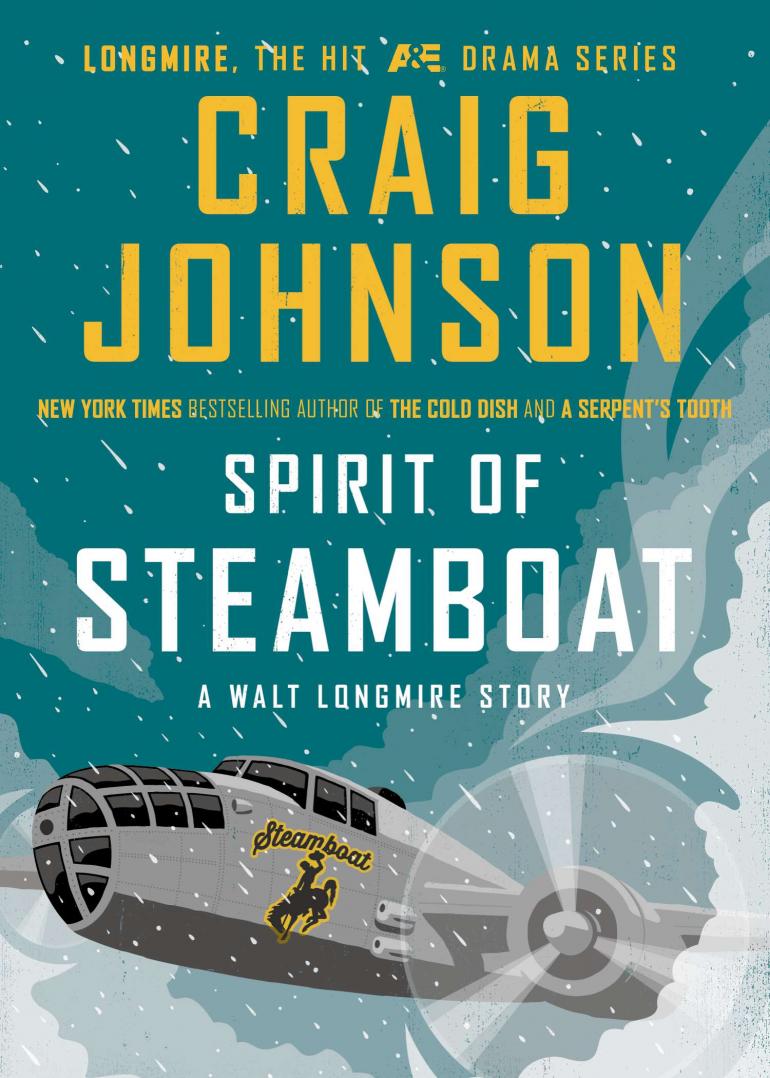
Spirit of Steamboat by Craig Johnson
Leave a Comment Here
A lot of people who read the books before watching the show (or vice versa) start comparing them to each other.
Try to avoid doing that.
I tell them to treat them as alternate universes.
Like when they do a reboot of Batman or Spiderman movies, or some group covers your favorite band's song.
They are very similar but different in their own way.
Enjoy them for what they are. Holding them up to each other does a disservice to both.


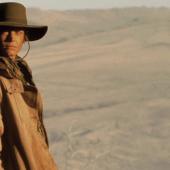



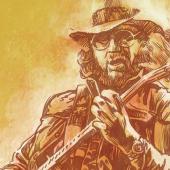
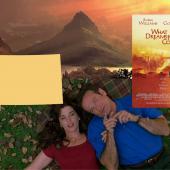

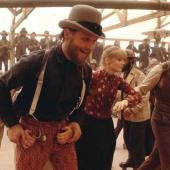

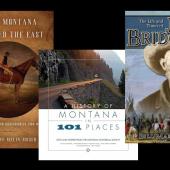
- Reply
Permalink